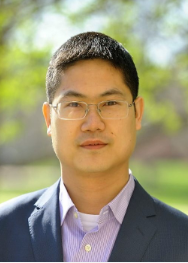主讲人:冯志钢博士
主办单位:经济学院
讲座平台:ZOOM软件

主讲人简介:
冯志钢博士,美国内布拉斯加大学经济系教授、中南财经政法大学文澜讲座教授、中南财经政法大学杰出校友。2009至2016年先后在瑞士苏黎世大学金融系、美国普度大学经济系、美国伊利诺伊大学香槟分校经济系从事宏观经济学、财政学、劳动经济学等研究工作。主要讲授课程为“中级宏观经济学”以及“宏观理论”。在《International Economic Review》、《Quantitative Economics》、《Review of Economic Dynamics》、《Economic Theory》等国际一流学术期刊发表高水平论文多篇。应邀在国际知名学府以及权威学术会议上宣读论文数十余次。多次担任《Journal of Economical Theory》、《Econometrica》、《Journal of Political Economy》等国际一流期刊的匿名审稿人。2015年11月召集主办“Mini-Conference on Quantitative Macro and Public Finance”。
Email:z.feng2@gmail.com
讲座主题及时间安排:
List of Topics & Tentative Agenda (subject to changes)
Why neo-classical growth model?
• Topic 1 [June 2]: Introduction to economic research. We will discuss the basic methodology in economic research, how to develop economic ideas etc.(北京时间6月2号晚上20:30-23:00)
• Topic 2 [June 2]: A brief history of modern macroeconomics. We will discuss rational expectation; neoclassical and neo-Keynesian; financial crisis and the development of macroeconomics.(北京时间6月2号晚上20:30-23:00)
• Topic 3 [June 4]: Solow growth model. We study Kaldor’s stylized facts about economic growth.(北京时间6月4号晚上20:30-23:00)
• Topic 4 [June 4]: Steady state analysis; transition dynamics.(北京时间6月4号晚上20:30-23:00)
Exercise and discussion I [June 7]:
• Solow growth model: theory and implications.
How to analyze the canonical growth model?
• Topic 5 [June 9]: One sector growth model in finite horizon. We formulize and study the optimization problem of a representative household who has finite planning horizon and face certain constraints.(北京时间6月9号晚上20:30-23:00)
• Topic 6 [June 9]: Lagrangian techniques in macroeconomics. We study how to rewrite the optimization problem with constraints into a Lagrangian problem. We also study the Kuhn-Tucker conditions.(北京时间6月9号晚上20:30-23:00)
• Topic 7 [June 11]: Optimal growth model in infinite horizon setting. The connection between finite and infinite horizon problem. The terminal condition, no-Ponzi scheme condition and Transversality condition. We will discuss how to rewrite the sequential optimization problem as a functional equation problem (Bellman equation).(北京时间6月11号晚上20:30-23:00)
• Topic 8 [June 11]: Dynamic programming, fixed-point theorem, principle of optimality, contraction mapping, theorem of maximum, etc. Those are critical tools for analyzing the infinite horizon model. We will focus on understanding the results instead of deriving the math.(北京时间6月11号晚上20:30-23:00)
Exercise and discussion II [June 14]:
• Lagrangian, Kuhn-Tucker conditions, Garcia and Zangwill transformation
• Dynamic programming, fixed point and contraction mapping
How to define, analyze and solve the Equilibrium of the model, Part I?
• Topic 9 [June 16]: Solving optimal growth model using value function iteration. We study how to write the sequential problem into recursive problem, understand their equivalence, and how to solve the recursive problem by iterations. We also study the Euler equation, Envelop theorem.(北京时间6月16号晚上20:30-23:00)
• Topic 10 [June 16]: Social planner’s problem and the competitive equilibrium. Discuss the role of a social planner. Learn how to define the competitive equilibrium, and its relationship with the social planner’s solution.(北京时间6月16号晚上20:30-23:00)
• Topic 11 [June 18]: The fundamental welfare theorems and Negishi algorithm. Understand efficiency versus equality.(北京时间6月18号晚上20:30-23:00)
• Topic 12 [June 18]: Arrow-Debreu trading vs. sequential trading. We will show the equivalence between these two market structures. Arrow-Debreu trading fundamentally changed how economists see the real economy.(北京时间6月18号晚上20:30-23:00)
Exercise and discussion III [June 21]:
• Value function iteration, solving Bellman equation via Guess and Verify
• Definition of equilibrium
• Different market structures and the equilibrium
How to define, analyze and solve the Equilibrium of the model, Part II?
• Topic 13 [June 23]: Recursive competitive equilibrium in macroeconomics. We study how to define Recursive competitive equilibrium, and how to solve based on FOC.(北京时间6月23号晚上20:30-23:00)
• Topic 14 [June 23]: Numerical solution to optimal growth model. We study the basic numerical skills to solve the canonical one-sector optimal growth model: interpolation, optimization, iteration, etc.(北京时间6月23号晚上20:30-23:00)
• Topic 15 [June 25]: A premier to MATLAB for macroeconomist.(北京时间6月25号晚上20:30-23:00)
• Topic 16 [June 25]: Programming and data analysis in macroeconomics. We explain the idea of calibrationby by matching the model with data.(北京时间6月25号晚上20:30-23:00)
Exercise and discussion IV [June 28]:
• How to define RCE
• Solving optimal growth model
How to use this model?
• Topic 17 [June 30]: Markov process and Real business cycle model. We study how to represent uncertainty and how to incorporate it into the framework we developed so far. We also study the business cycle.(北京时间6月30号晚上20:30-23:00)
• Topic 18 [June 30]: Calibration and estimation in macroeconomics. We learn how to calibrate and estimate the model. So that we can derive quantitative implications from the theory.(北京时间6月30号晚上20:30-23:00)
• Topic 19 [July 2]: Balanced growth path in optimal growth model. We discuss how to deal with model with growth trend.(北京时间7月2号晚上20:30-23:00)
• Topic 20 [July 2]: Application of Real business cycle model.(北京时间7月2号晚上20:30-23:00)
Exercise and discussion V [July 5]:
• Markov process and uncertainty
• Calibration of a simple model
• Balanced growth path

